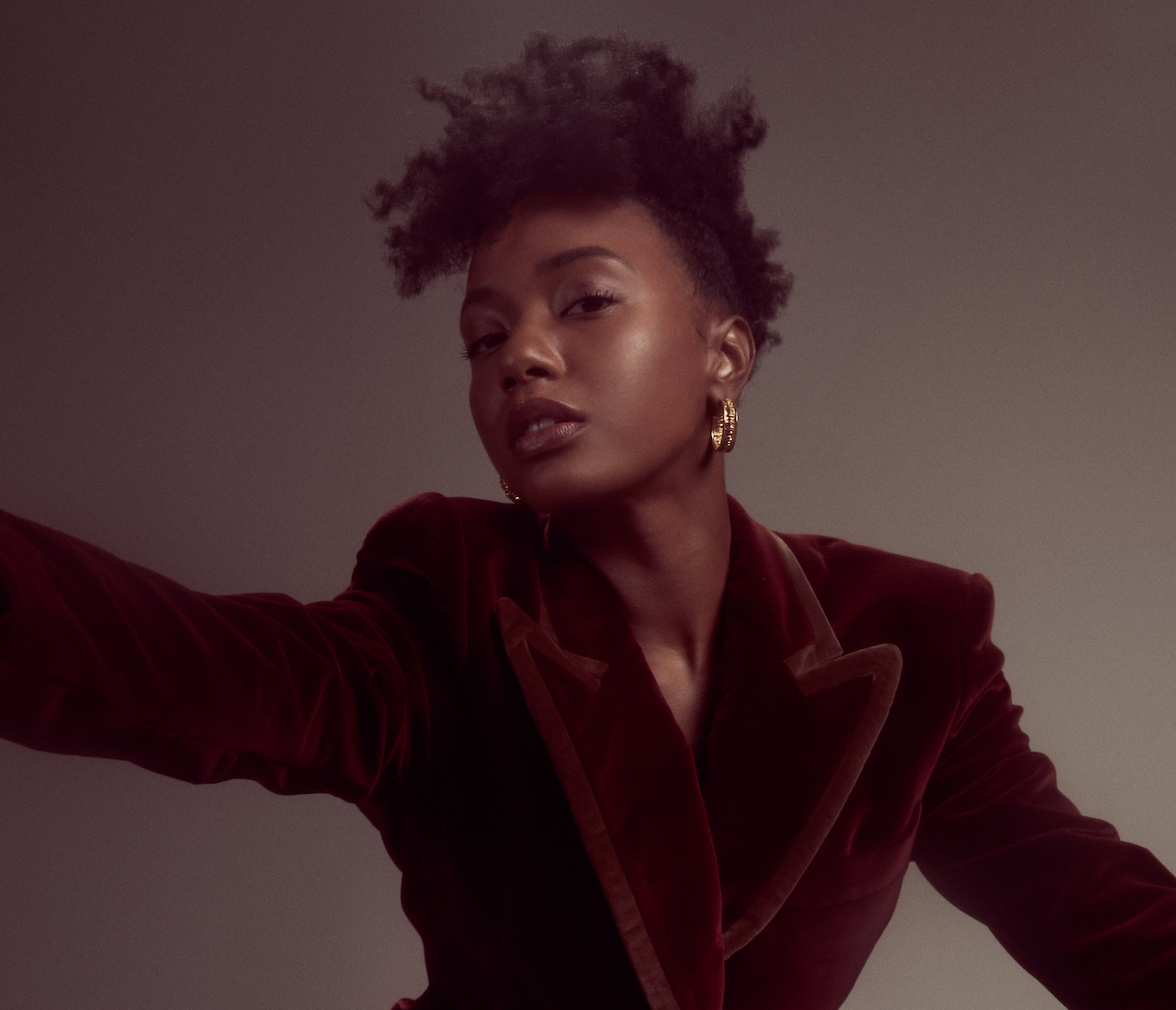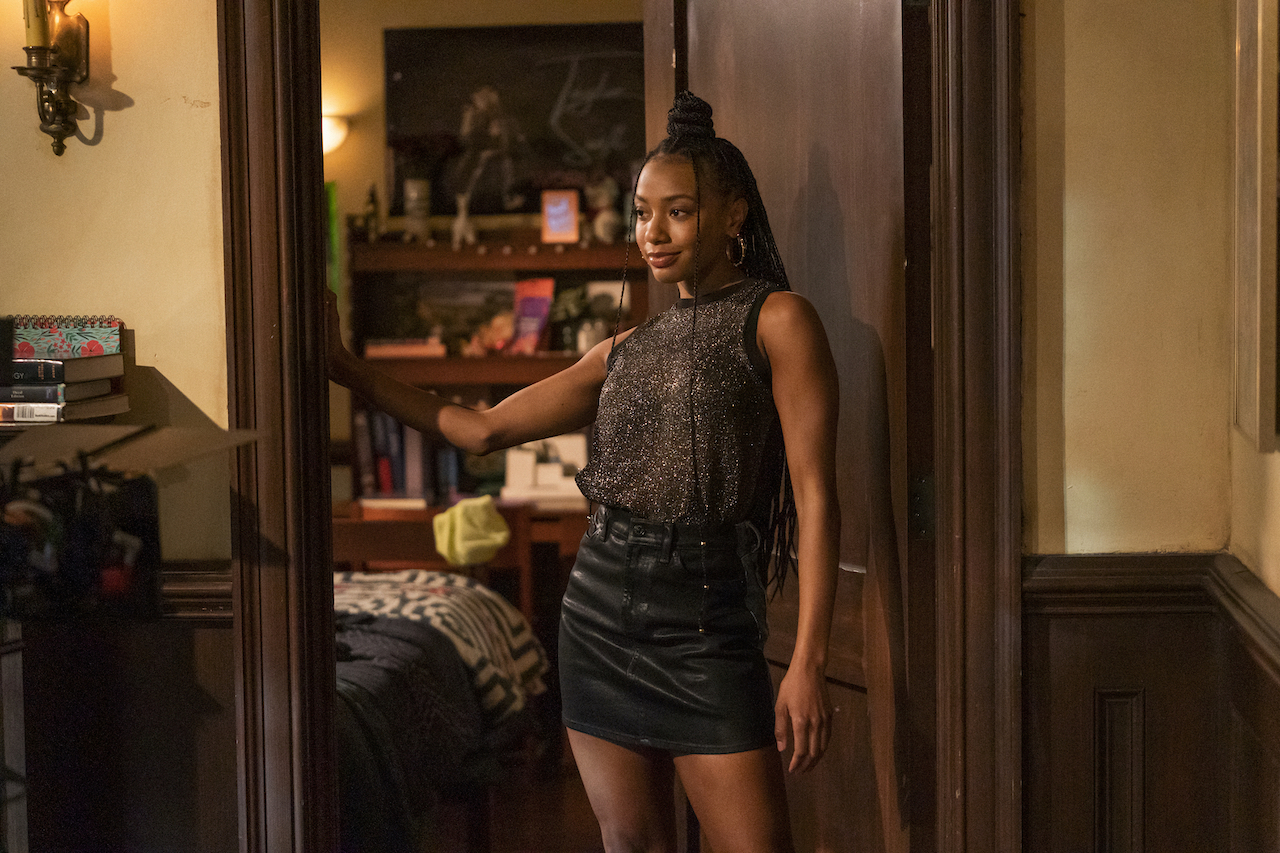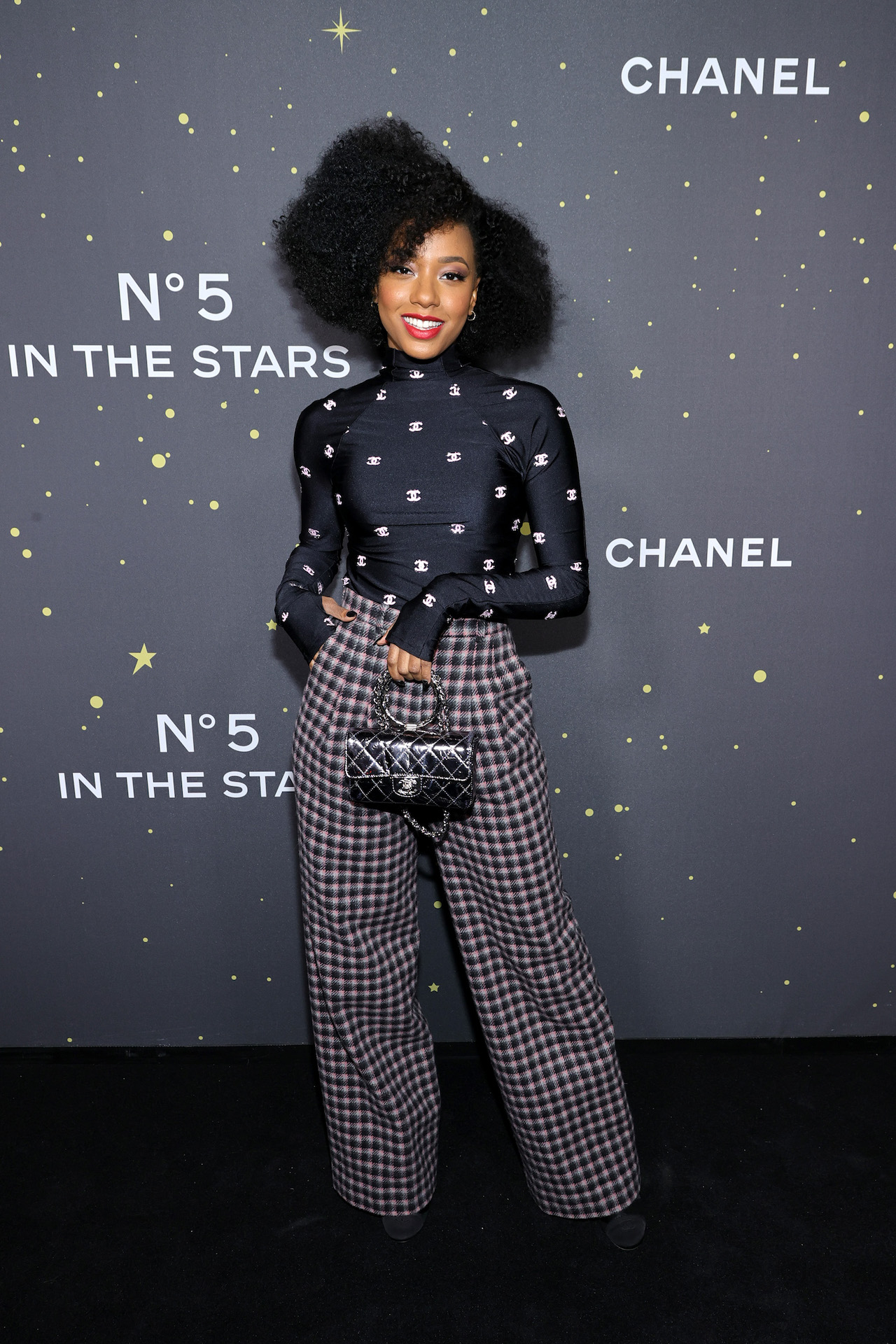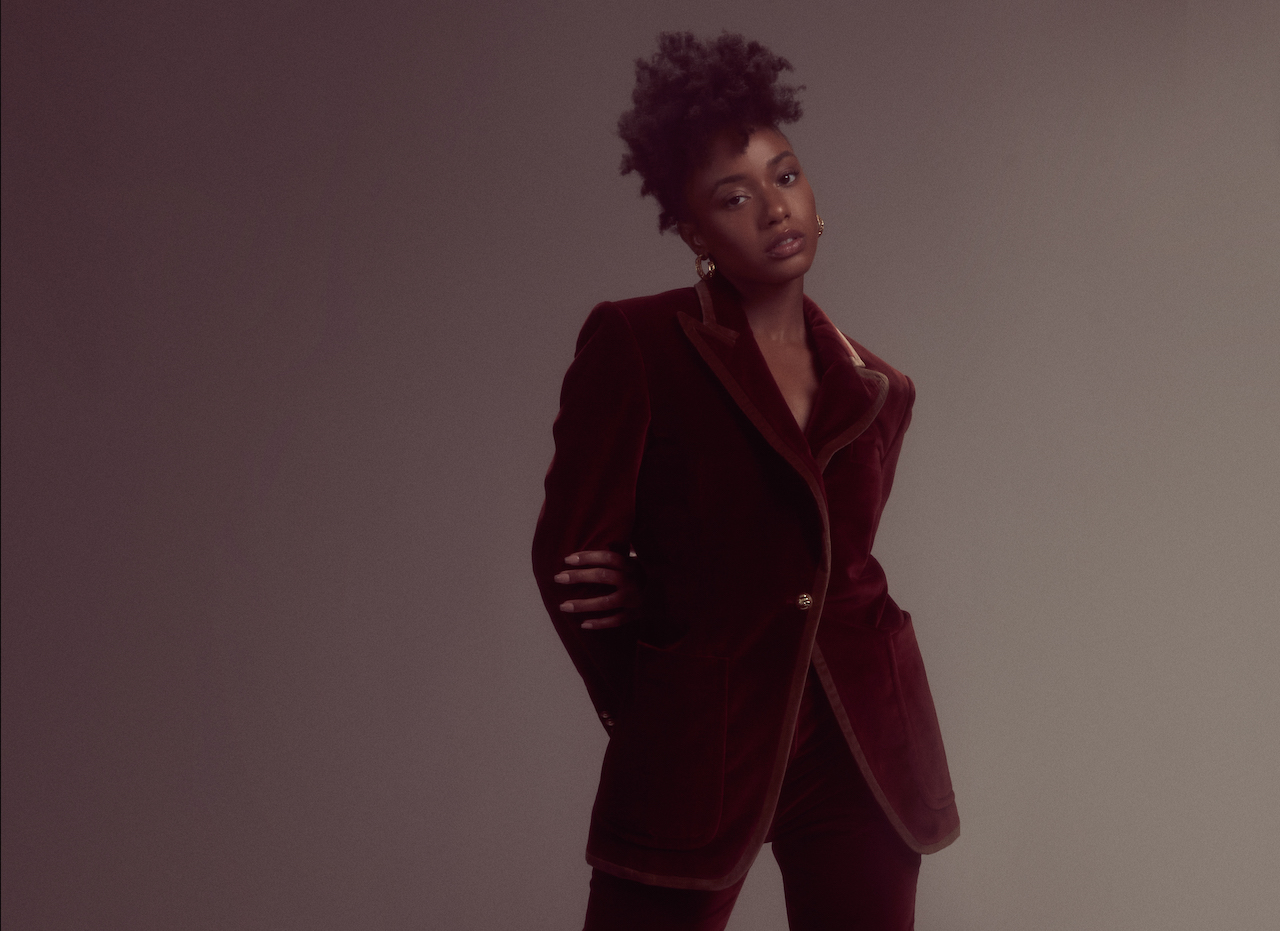

The Sex Lives of College Girls, a new comedy series from Mindy Kaling and Justin Noble, premieres on HBOMax this week. It is a really bad title for a really good show. Based on the title alone, at first I resisted even watching the screeners sent to me in order to interview one of its stars, Alyah Chanelle Scott, who plays Whitney in the series—the soccer jock daughter of a US senator. In case systemic sexism—a theme threaded throughout the series—made you think I meant the senator is her father? Wrong. The senator is Whitney’s mother, and is played by Sherri Shepherd.
Other cast members include Pauline Chalamet (yes, Timothée’s sister) who plays a midwestern freshman in need of scholarships at a prestigious East Coast college. Chalamet has her brother’s eyes, so if you only tune at first in to stare into those, I’ll wager you’ll stay to watch the rest of the episodes once you’re hooked on the show’s wit, intelligence, and wanton charm. It certainly surprised me with all those qualities. And, yes, I was hooked.
Scott and Chalamet’s cast mates are Amrit Kaur, who portrays an Indian American who longs to be a comedy writer, and Reneé Rapp, who plays a wealthy legacy student whose own longing is a secret one that is revealed at the end of the premiere episode. The ensemble work of these four women is balletic in its comedic timing when not bumping and grinding to the challenging beats Kaling and Noble throw into their keenly observed scripts, which also include characters who are transgender, LGBTQ, and disabled—including even the fractal of white frat bros embedded still in the narrative pattern of such college-set series—without seeming to be just boxes checked off in the writers room.

The Sex Lives of College Girls, a new comedy series from Mindy Kaling and Justin Noble, premieres on HBOMax this week. It is a really bad title for a really good show. Based on the title alone, at first I resisted even watching the screeners sent to me in order to interview one of its stars, Alyah Chanelle Scott, who plays Whitney in the series—the soccer jock daughter of a US senator. In case systemic sexism—a theme threaded throughout the series—made you think I meant the senator is her father? Wrong. The senator is Whitney’s mother, and is played by Sherri Shepherd.
Other cast members include Pauline Chalamet (yes, Timothée’s sister) who plays a midwestern freshman in need of scholarships at a prestigious East Coast college. Chalamet has her brother’s eyes, so if you only tune at first in to stare into those, I’ll wager you’ll stay to watch the rest of the episodes once you’re hooked on the show’s wit, intelligence, and wanton charm. It certainly surprised me with all those qualities. And, yes, I was hooked.
Scott and Chalamet’s cast mates are Amrit Kaur, who portrays an Indian American who longs to be a comedy writer, and Reneé Rapp, who plays a wealthy legacy student whose own longing is a secret one that is revealed at the end of the premiere episode. The ensemble work of these four women is balletic in its comedic timing when not bumping and grinding to the challenging beats Kaling and Noble throw into their keenly observed scripts, which also include characters who are transgender, LGBTQ, and disabled—including even the fractal of white frat bros embedded still in the narrative pattern of such college-set series—without seeming to be just boxes checked off in the writers room.
“I hope that people are beginning to show up and instead of checking boxes that they are inherently beginning to put that into the work so that it doesn’t come off forced or contrived,” says Scott when she Zooms in from Los Angeles, where she lives. “The norm becomes inclusive and equitable and diverse. Mindy seems to be very good at that in her canon of work. She often includes something we don’t see that often, which is young black and brown girls not being hyper-sexualized but just being sexual and having the experiences that we see young white women having all the time—but just to see it in a different way—and to see disabled people having the same experience, just seeing different bodies and different types of people. And it’s done not necessarily to check boxes but just to represent people. I hope that that’s what the work continues to be.”
But back to that title. “It put me off, too,” says Scott. “I read the cast breakdown and that title and sent it back to my agent and said, ‘Maybe not for me. I’m going to pass on this and this title.’ But one of my reps told me just to read the script for the pilot and tell her what I thought. And I was like: Oh, I see. Because the show is not really about the act of sex, but about all the experiences around the idea of sex and everything that comes with that. It is not this hyper-sexualized pornographic representation of what young girls go through—which is very awkward and embarrassing and uncomfortable, yet also fun and thrilling. It definitely follows more those experiences than the act of sex itself. It is interesting how the characters function as a unit: you laugh at them individually except for my character Whitney, and you laugh with her.”

Scott indeed stands out in the series for her stillness within the busy frame of a comedy series and because, unlike the others, she seems to feel no need to comment on who she is portraying in a performative way within her characterization of Whitney.
“She’s sort of the voice of reason and brings the audience’s perspective into the absurdity of some of the comedy,” says Scott. “It was an interesting thing to play because energetically I was set at such a different level than the rest of them. Often I just felt wrong somehow doing it. The character doesn’t know how to be on her own. She so desperately wants to be an individual because she’s been in this very controlled environment with her mom.”
Scott’s own deeply religious mother—whom she describes to me as a “badass”—is an aerospace engineer at NASA in Texas where Scott grew up in a suburb of Houston called Pearland. Was Scott’s getting the role of Whitney a bit of typecasting?
“My mom is an engineer and my dad is in finance at a car company,” she says. “They did not get it at all, this Black girl seeing herself in art. They were supportive but they were like: We don’t know what to do with you. But the more theatre I did, the more I fell in love with it. And then I learned that you could do it as a job. At that point my parents were, well, no.
“My senior year in high school I was in the musical Beauty and the Beast. I got to play Belle and this was a really transformative experience in that it was a dream I didn’t realize I had—and it was happening in real time,” says Scott. “Plus, I got to see how it impacted the community in this southern little town. I thought, wow, if I can do this on a larger scale and also surround myself with people who are also passionate about doing this same thing on that scale, it would be amazing.”
Was she saying that for her mostly white audience that seeing Belle as an African American was an eye-opening experience for them and, in some way, was a political act on her part as well as an artistic one? “Yes, very much so,” says Scott. “I was just doing a role that I was excited about doing, but also then seeing the impact that it had, I thought it was cool that I had the ability to share my experience in a way and open this door to this conversation to people who maybe didn’t expect it.”

That brings us to Texas and its conservative culture and what it was like for an artistic Black child to grow up surrounded by it. Most recently, the state has been portrayed in national media as a place where Roe v. Wade has gone to die and where voter suppression laws have been put into effect. Is it being portrayed correctly?
“I think Texas is being portrayed exactly as it is—and yet also in ways not at all how it is,” she says. “When I was younger, I so desperately wanted to leave. I couldn’t wait to get out. One of the reasons I went to college at the University of Michigan was to leave. I just needed to experience a place other than Texas. There is so much trauma you inherently swallow in your body when you’re growing up that you’re not even aware that you’re doing it. In addition to that, I was caught in this idea of chasing a perception of what it is to be a Black person. I was a cheerleader and I was surrounded by pretty popular white girls and I so desperately wanted to find my spot in this group—and that meant, in many ways, betraying myself and who I knew myself to be in order to try to fill their token Black girl spot.
“I wasn’t necessarily aware that I was doing this at age 12,” she says. “Anyone who is that age is trying to find who they are. And in a lot of ways when you’re a young person of color—or any member of any marginalized group when you’re growing up in the south—you’re not allowed to find who you are generally and sort of struggle to find who you can be to all these other people. So I wanted to get away so I could have a second to breathe and be able to explore my identity separate from the perception of all my white friends and all the systems and ways in the south that make you just feel so othered. I think on a larger scale that Texas being seen as it is is so great because systematically there is so much wrong there. You feel it from kindergarten to graduation. I have been talking to my friends recently about imposter syndrome. I have started to realize that it is something that I can speak to in my experiences as a young Black woman. I think it is something I learned early in my life.”
I ask her if she could expound a bit more on imposter syndrome for Grazia readers.
“Imposter syndrome is thinking that you don’t necessarily deserve or belong in the spaces that you are inhabiting,” Scott says. “I dealt with a lot of imposter syndrome on this show—as me and also as Whitney. Whitney definitely experiences it as well. But as Alyah entering the space and walking onto the Warner Bros. lot and all these doors opening I kept thinking: Why me? Why am I here? What’s going on? And I think aspects of that are real and true, but also I think a lot of it is about my past trauma of realizing my body subconsciously knows that there are systems in place that desire to keep me out of these spaces so that when I step into these spaces I’m now questioning myself because of all these systems. That’s trauma I didn’t ask for but I inherently have. And it was definitely work every single day on the set to say to myself, ‘Put that out of your mind because it’s not real. You’re here because you’re supposed to be here.’
“Now many days I failed at that,” she says. “Many days I had anxiety on set. But that was the lesson I was learning. Looking back on it now I get so mad at myself because I let that Texas ideology—all that shitty fucking systems shit—get in my own head and mess with my perception of what I deserve and where I deserve to be. All these thing go together.”
They came together for Scott when she was touring in The Book of Mormon, a musical that went back into rehearsal after the lockdown before it reopened on Broadway in order to focus on rewrites that addressed some of the concerns of its Black cast members, concerns that caused Scott real trauma when she was on tour as the female lead Nabulungi in the show.
“I’m not at all sure what I can say about this,” she says. “It is a show I would never do again, if that makes sense. I think it changed me in a lot of ways because I traveled across the country with this production which had a large ensemble of Black actors onstage. Every single night I would look out into the audience I would just see a sea of white season ticket holders. It would just really make me feel odd. I couldn’t get past the feeling of just feeling odd. And feeling strange about it.”
“Objectified?” I ask. “Exoticized?”
“Yeah. I just hated that I couldn’t share the experience with people who looked like me,” she says. “I was representing something on the stage and wasn’t even aware if the audience was understanding what I loved about it. It is an interesting show in that the audience laughs at the Black ensemble and also at times laughs with the Black ensemble. It was this weird dichotomy of feeling that I was really hoping that they were understanding the show the way I was understanding it. But I know they never will because they don’t have my understanding of the Black experience. It was hard. It was so hard. It was hard to be away from my family and my friends and also to feel eight times a week that I was living this experience and I couldn’t find a way to connect or find my way out of it. It wasn’t landing the way I wanted it to land on audience members. I just felt it was falling on deaf ears at times.
“It was very much a thing for them to come out and have a good time and laugh maybe sometimes at us, but not really get the story we were trying to tell,” she continues. “It just made me so upset. When the pandemic hit I finally got to take a breath. That touring production sadly closed for all those involved. But I got to realize I don’t have to put myself in situations where I feel that again. I learned from that experience the kind of work I want to do and I know that is work that centers on Black voices and uplifts them in a way that is undeniably understood as what it is. Whereas with that show, you can take it for that or you can just have a good time. I want the work that I do to have a very clear message and a very specific one and that is something I never would have learned if I had not had that tough experience. Theatre is hugely moving and has the potential to be impactful I think if done in the right way with the right intentions. That is what I hope.”
Alyah Chanelle Scott is a bit of a badass herself—just like her beloved mother. Who are some of her heroes other than her mom?
“Tough question,” she says. She pauses to think. “Issa Rae. I worship the ground she walks on. But more so than anything as weird as it sounds, I am really inspired by Gen Z. I guess technically I’m part of Gen Z since I was born in 1997. But I learn so much from the younger generation. My little brother is part of it and watching the way they navigate spaces because they have had so much access to so much information via social media and the internet in general. Their ways of thinking are so progressive and enhanced. Older people tend to be very jaded about Gen Z. But I think that is a testament to how dope Gen Z is and how change-making they are going to be when they start getting put in these spaces.” She pauses again trying to come up with some specific names. “Toni Morrison,” she says. “She’s a hero. I love reading her. And Michelle Obama. Becoming is the Bible.”
I’m not sure how Scott’s religious badass mom will react to her saying such a thing so I ask her to talk about her deeply religious upbringing down in Texas. “Yes, I grew up very religiously,” she says. “On Halloween my family used to go to church. We went to church on Halloween. They would call it Hallow-lujah. night. As I got older, I sort of found my own way in spirituality and religion. But my parents are very religious. When I got this job, I called home and said, ‘Hey, Mom. I got a job. It’s on a show called…’ Scott stops and lowers her voice and transforms it into a little-girl one sounding perhaps like that 12-year-old who was a cheerleader trying to please everybody down in Pearland, Texas, including a couple of amen-ing parents. ‘The Sex Lives of College Girls.'” She laughs now, the sound wholly adult and that of a woman finding her way in the world with her own version of the wit and intelligence and wanton charm so evident in the series in which she now stars. “I think my mom was in shock for months. But now she is finally excited.”
“Will she be upset that—spoiler alert—you’re fucking your white soccer coach?”
Again that grown-up laugh comes Zooming through my computer screen at me. “She knows it’s acting,” Scott says. “We actually had a little conversation about it prior to my starting the job. She was asking if I were sure I wanted to do this. I told her, yes, and she was okay. Right before I started working she called and said, ‘Hey, don’t worry about us. Do your job. We’re proud of you.’ It was a very sweet moment.”













